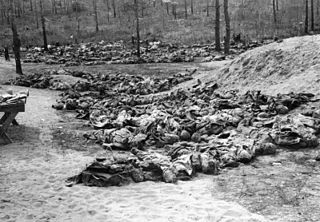போலந்து குடிமக்கள் மீதான சோவியத் அடக்குமுறை (1939–1946)
 1943 ஆம் ஆண்டு ஏப்ரல் 30 ஆம் தேதி தடயவியல் பரிசோதனைக்காகக் வைக்கப்பட்டிருக்கும், கட்டின் படுகொலை புதைகுழிகளிலிருந்த போலந்து போர்க் கைதிகளின் உடல்கள் | |
| சோவியத் ஒன்றியத்தின் போலந்து படையெடுப்பு | |
|---|---|
|
செப்டம்பர் 1939 இல் நடந்த போலந்து மீதான ஜெர்மன் மற்றும் |சோவியத் படையெடுப்பிற்குப் பிறகு, போலந்து நாட்சி ஜெர்மனிக்கும் சோவியத் ஒன்றியத்திற்கும் இடையில் பாதியாகப் பிரிக்கப்பட்டது. படையெடுப்பின் தொடக்கத்தில் சோவியத் போலந்து அரசை அங்கீகரிப்பதை நிறுத்தியது.[6][7] 1939 முதல் ஜெர்மன் மற்றும் சோவியத் அதிகாரிகள் போலந்து தொடர்பான கொள்கைகள் மற்றும் அடக்குமுறை நடவடிக்கைகளை ஒருங்கிணைத்தனர். படையெடுப்பைத் தொடர்ந்து ஏறக்குறைய இரண்டு ஆண்டுகள், இரண்டு ஆக்கிரமிப்பாளர்களும் கெஸ்டபோ-என்கேவிடி மாநாடுகளின் போது போலந்து எதிர்ப்பைக் கையாள்வதற்கான இருதரப்பு திட்டங்களைப் பற்றி யூன் 1941 இல் சோவியத் ஒன்றியத்திற்கு எதிரான ஜெர்மனியின் பர்பரோசா நடவடிக்கை வரை விவாதித்தனர்.[8]
குறிப்புகள்[தொகு]
- ↑ Gross 1997, chpt. Sovietisation of Poland's Eastern Territories. From Peace to War, p. 77. ISBN 1571818820.
- ↑ George Sanford (political scientist) (2005). Katyn and the Soviet Massacre of 1940. Routledge. பக். 20–24. பன்னாட்டுத் தரப்புத்தக எண்:0415338735. https://books.google.com/books?id=PZXvUuvfv-oC&q=Soviet+invasion+of+Poland+1939&pg=PA20.
- ↑ AFP / Expatica (30 August 2009), Polish experts lower nation's WWII death toll பரணிடப்பட்டது 2012-04-06 at the வந்தவழி இயந்திரம், Expatica Communications BV.
- ↑ Joanna Ostrowska, Marcin Zaremba, "Kobieca gehenna" (The women's ordeal), Polityka - No 10 (2695), 2009-03-07; pp. 64-66. (in போலிய மொழி)
Dr. Marcin Zaremba பரணிடப்பட்டது 2011-10-07 at the வந்தவழி இயந்திரம் of Polish Academy of Sciences, the co-author of the article cited above – is a historian from Warsaw University Department of History Institute of 20th Century History (cited 196 times in Google scholar). Zaremba published a number of scholarly monographs, among them: Komunizm, legitymizacja, nacjonalizm (426 pages),[1] Marzec 1968 (274 pages), Dzień po dniu w raportach SB (274 pages), Immobilienwirtschaft (German, 359 pages), see inauthor:"Marcin Zaremba" in Google Books.
Joanna Ostrowska பரணிடப்பட்டது 2016-03-14 at the வந்தவழி இயந்திரம் of Warsaw, Poland, is a lecturer at Departments of Gender Studies at two universities: the Jagiellonian University of Kraków, the University of Warsaw as well as, at the Polish Academy of Sciences. She is the author of scholarly works on the subject of mass rape and forced prostitution in Poland in the Second World War (i.e. "Prostytucja jako praca przymusowa w czasie II Wojny Światowej. Próba odtabuizowania zjawiska," "Wielkie przemilczanie. Prostytucja w obozach koncentracyjnych," etc.), a recipient of Socrates-Erasmus research grant from Humboldt Universitat zu Berlin, and a historian associated with Krytyka Polityczna. - ↑ Tomasz Szarota & Wojciech Materski (2009), Polska 1939–1945. Straty osobowe i ofiary represji pod dwiema okupacjami, Warsaw: Institute of National Remembrance, ISBN 978-83-7629-067-6 (Excerpt reproduced in digital form).
- ↑ Telegrams sent by Schulenburg, German ambassador to the Soviet Union, from Moscow to the German Foreign Office: No. 317 பரணிடப்பட்டது 2009-11-07 at the வந்தவழி இயந்திரம் of 10 September 1939, No. 371 பரணிடப்பட்டது 2007-04-30 at the வந்தவழி இயந்திரம் of 16 September 1939, No. 372 பரணிடப்பட்டது 2007-04-30 at the வந்தவழி இயந்திரம் of 17 September 1939. The Avalon Project, Yale Law School. Retrieved 14 November 2006.
- ↑ 1939 wrzesień 17, Moskwa Nota rządu sowieckiego nie przyjęta przez ambasadora Wacława Grzybowskiego (Note of the Soviet government to the Polish government on 17 September 1939, refused by Polish ambassador Wacław Grzybowski). Retrieved 15 November 2006.
- ↑ "Terminal horror suffered by so many millions of innocent Jewish, Slavic, and other European peoples as a result of this meeting of evil minds is an indelible stain on the history and integrity of Western civilization, with all of its humanitarian pretensions" (Note: "this meeting" refers to the most famous third (Zakopane) conference).
Conquest, Robert (1991). Stalin: Breaker of Nations, New York, N.Y.: Viking. ISBN 0-670-84089-0
உசாத்துணை[தொகு]
- Timothy Snyder, Bloodlands: Europe between Hitler and Stalin, New York, Basic Books, 2010.
- Rafał Wnuk, 'Za pierwszego Sovieta'. Polska konspiracja na Kresach Wschodnich II RP (Wrzesień 1939 – Czerwiec 1941). பரணிடப்பட்டது 2011-06-11 at the வந்தவழி இயந்திரம் Book excerpt. Institute of National Remembrance.
